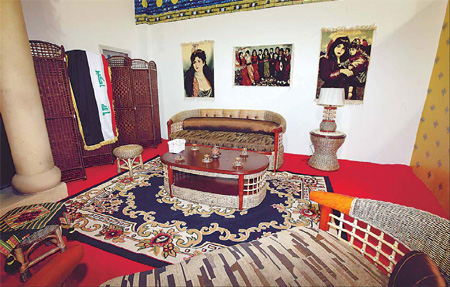Iraq enjoys fairytale beginning to the Expo
 |
| Trinkets, clothing and furniture are displayed in the Iraq Pavilion. |
Scenes from the Arabian Nights dominate Iraq's national pavilion, but the country is not relying on flying carpets or genies in magic lanterns to rebuild its cities after years of war and internal civil strife.
Based on the theme "Next City, Next Miracle", the pavilion, which shares a building with Myanmar and Laos, foregrounds a floor model of the holy Shiite city of Najaf. China is helping rebuild Najaf by contributing $250 million.
The rebuilt version, which is expected to be finished in 2013, appears like an oasis of calm replete with modern apartments strewn among green spaces and waterways.
"I think it's a beautiful city, good for the people living there," said 32-year-old Liu Bo from Tianjin, an industrial city near Beijing.
"I didn't know China was doing this, but I don't mind some of my tax money going there. Who'd have thought, 50 years ago we'd be in a position to help them? Anyway, Tianjin will look much more beautiful than this in 50 years."
The Iraq Pavilion, which opened on June 1 after the country agreed to participate only on April 20. This made it the last of the Expo 2010 Shanghai's 246 participants to be up and running.
"Despite many difficulties, Iraq has presented an exquisite pavilion to visitors," said Zhou Hanmin, deputy director of the Expo executive committee.
Instead of tugging at visitors' heartstrings or appealing for help, the focus is on folk tales and Iraq's glorious past, when it was a trading center known as Mesopotamia, a place still considered the cradle of civilization.
Props inside the pavilion evoke the Hanging Gardens of Babylon from the 6th century BC, one of the Seven Wonders of the World. There is also a scene from the Arabian Nights showing the Persian King Shahryar beguiled by the fantastic tales of Queen Scheherazade - a ruse that stopped him marrying virgins and killing them the next day.
"We grew up hearing these beautiful stories at school but I never guessed they came from Iraq," said Li Yingchen from Henan province. "I was so surprised to see Iraq at the Expo that I called my friend to tell her."
There are also references to Mesopotamia's great inventions like cuneiform, which translates as "wedge-shaped". This stands as one of the earliest forms of writing, with people using reeds to record their daily accounts on tablets of wet clay.
With parts of the country in turmoil, records like these strike an emotional chord.
They also share space with trinkets, clothing and furniture from the country's present, including banknotes featuring the face of deposed leader Saddam Hussein.
"I came here to find Saddam," joked one middle-aged man from China's Fujian province. "My wife keeps telling me I look like him."
 0
0 






